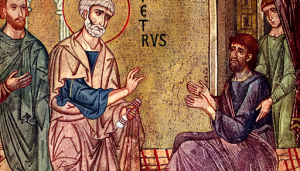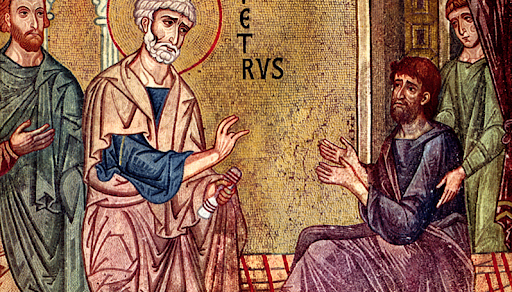 There are six Sundays in the forty day celebration of the Resurrection (corresponding to the forty days until the Ascension as recorded in the Gospel of Luke). The first three Sundays have a gospel of the Resurrection and the second three a gospel with a baptismal theme. In our day the baptismal theme of the Feast of Pascha has been eclipsed, probably because, more sadly, the Church no longer is growing (except maybe a little) by adult baptisms. At the Paschal Vigil, however, we heard the connection: “Or are you unaware that we who were baptized into Christ Jesus were baptized into his death? We were indeed buried with him through baptism into death, so that, just as Christ was raised from the dead by the glory of the Father, we too might live in newness of life” (Romans 6:3-4).
There are six Sundays in the forty day celebration of the Resurrection (corresponding to the forty days until the Ascension as recorded in the Gospel of Luke). The first three Sundays have a gospel of the Resurrection and the second three a gospel with a baptismal theme. In our day the baptismal theme of the Feast of Pascha has been eclipsed, probably because, more sadly, the Church no longer is growing (except maybe a little) by adult baptisms. At the Paschal Vigil, however, we heard the connection: “Or are you unaware that we who were baptized into Christ Jesus were baptized into his death? We were indeed buried with him through baptism into death, so that, just as Christ was raised from the dead by the glory of the Father, we too might live in newness of life” (Romans 6:3-4).
This Sunday, we see this is the story of the Paralytic Man. Maybe we can retitle it: the Sunday of the Friendless Lame Man. He was without friends, paralyzed for thirty-eight years and unable to get into the pool when the angel touched the waters. However, he finds a friend in our Lord, who asks, “Do you want to be well?” This gospel affirms the sacramental mystery of baptism: it is not the water touched by an angel that cures the man, but the ultimate power of healing comes from the Lord, in the waters of baptism touched by the Holy Spirit sent by the Lord. The Gospel of John is truly a proclamation of the Son of God who sends the Spirit. It also affirms the meaning of baptism, which is the rejection of evil and the commitment to Christ. “Do you want to be well?” Jesus asks, and then the healed man proclaims Jesus as his Healer. Some of the liturgical meaning is lost in some modern Bibles who relegate verse 4 about the angel touching the water to a footnote.
Most of us were baptized as babies. We were not friendless, for we were brought to the baptismal font by loving parents and godparents. We are like the Paralytic in one way, just as he did not know who healed him, we also did not know Christ, but we had to be taught as we grew up in the grace of God. As adults, we often do not know that Jesus is working in our lives. We often do not realize how he blesses us. Like the Paralytic we all have to come to that knowledge so that we too can profess who heals us. “O Christ, cure my soul as you once cured the paralytic man, for it is under the influence of evil and sin. Guide me that I may walk in your paths” (Ode 5, Matins).
“From time to time an angel of the Lord came to stir up the waters of the pool of the Sheep-gate. One man recovered his health, but now an infinite number are saved by Christ through baptism” (Ode 4, Matins).
Meditation by Archpriest David Petras
